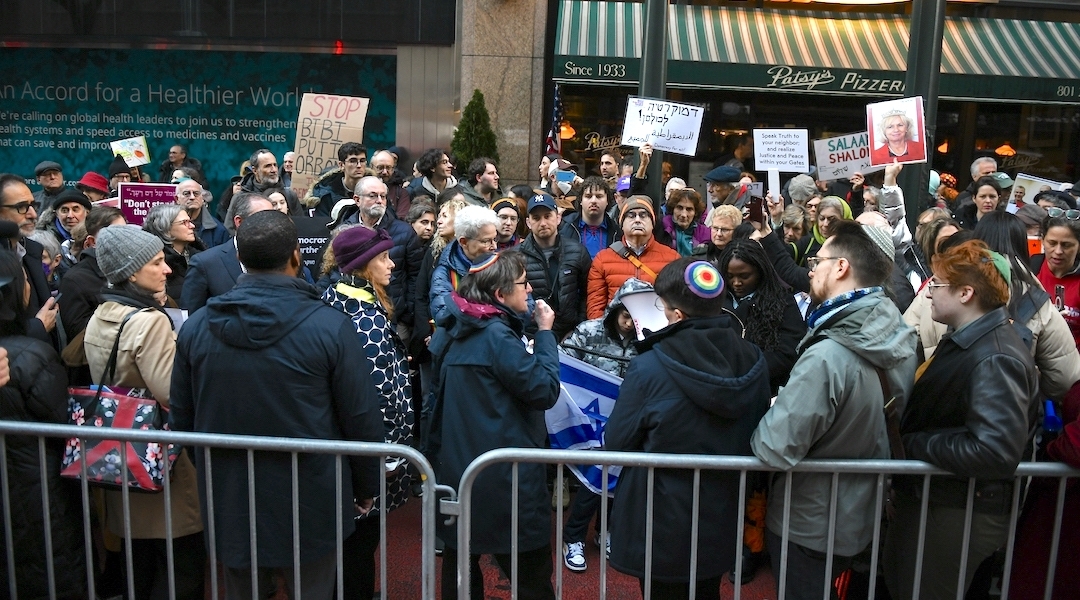(New York Jewish Week) — American Jewish progressive organizations drew hundreds of New Yorkers out in the rain opposite the Israeli Consulate in Manhattan on Tuesday to show support for democracy in Israel and protest its government’s proposed court reform.
Hundreds of thousands of people across Israel have turned out to weekly protests opposing the plan, and smaller groups of Israel expatriates have held satellite protests abroad. Tuesday’s protest was different, organized and largely attended by American Jewish groups that support progressive policies in Israel.
“We are here because there is a massive attack on democracy that’s devised by extremist politicians who are corrupting Judaism to turn Israel into a fascist theocracy,” Rabbi Jill Jacobs, CEO of T’ruah, the liberal rabbinic human rights group that co-hosted the demonstration, said at the event as attendees sought shelter under umbrellas. “We are here to say that is not our Judaism, and that is not our Israel.”
The court reform plan advanced by Israeli Prime Minister Benjamin Netanyahu’s right-wing government would give the governing coalition near total control over the appointment of Supreme Court judges, and would enable a bare majority of lawmakers to override Supreme Court decisions, among other changes. Parts of the plan passed a key legal hurdle earlier on Tuesday.
Tuesday’s rally was hosted by the Progressive Israel Network, a coalition of liberal Jewish groups including T’ruah, J Street, the New York Jewish Agenda, Ameinu, the Jewish Labor Committee, the New Israel Fund and others.
Some of those groups now find themselves in the unusual position of advocating for a stance held by a majority of Jewish Israelis. Some of the co-hosts, for example, opposed President Donald Trump’s recognition of Jerusalem, which most Jewish Israelis supported, or supported the Iran nuclear agreement, which most Jewish Israelis opposed. Not so with the court reform: The groups at the rally, and the majority of Israeli Jews, have said they oppose the plan.
“The majority of Israelis are speaking out and I hope that changes will occur,” said Matt Nosanchuk, the outgoing executive director of the New York Jewish Agenda. “Even if these reforms pass, that doesn’t mean we stop protesting. We will keep finding ways for them to be reversed.”
Jacobs told the New York Jewish Week that stopping the court reform should also be important to people who support Palestinian rights.
“This will enable this government to move forward some truly terrible moves that will have an even greater effect on the human rights of both Palestinians living under occupation and Israeli Jews,” she said.
Israel’s control of the West Bank was mentioned at the rally. New York City Comptroller Brad Lander, who is Jewish, called in his speech for “an end to the occupation” and said the Democratic party “cannot continue to toe the AIPAC line,” a reference to the influential pro-Israel lobby that assertively defends Israeli policy and counters criticism of Israel.
‘We cannot continue to write a blank check to an increasingly authoritarian regime,’ Lander said.
Jonathan Kopp, a J Street board member, said democratic values shared by Israel and the United States are “under assault by this right-wing government.”
“Just as President [Joe] Biden has made protecting American democracy here [a priority], we urge him to directly confront Netanyahu’s extremist plans, which would subvert democracy in the service of settlements, demolitions and occupation,” he said.
Some participants at the rally said they wished its message went further. Eva Borgwardt, the political director of IfNotNow, a Jewish organization that opposes Israel’s occupation of the West Bank, said advocacy for Palestinian rights felt lacking at the rally, at at time that “could actually be a moment for the American progressive movement to coalesce.”
“I think that there weren’t a lot of signs about apartheid at this protest,” Borgwardt said, who was holding a sign that said “No Democracy With Apartheid.” Prominent human rights groups, including Amnesty International and Human Rights Watch, have said Israel is guilty of apartheid in its treatment of the Palestinians. Israel vociferously rejects the comparison to South Africa’s former system of racial segregation.
“Especially with the current government, it’s becoming even more of a problem,” Borgwardt added. “We have to unify around the problem if we’re going to be powerful enough to actually achieve a solution.”
Shaul Franco, 38, an Israeli who has lived in New York for three and half years, said he came to the rally because “things have been going in a very bad trajectory for so long.” Franco added that he’s not sure if he will go back to Israel “anytime soon.”
“We want to see a much stronger pushback from the [American] president,” Franco said. “But I don’t count on them doing Israel’s job.”
The New York Jewish Week brings you the stories behind the headlines, keeping you connected to Jewish life in New York. Help sustain the reporting you trust by donating today.





